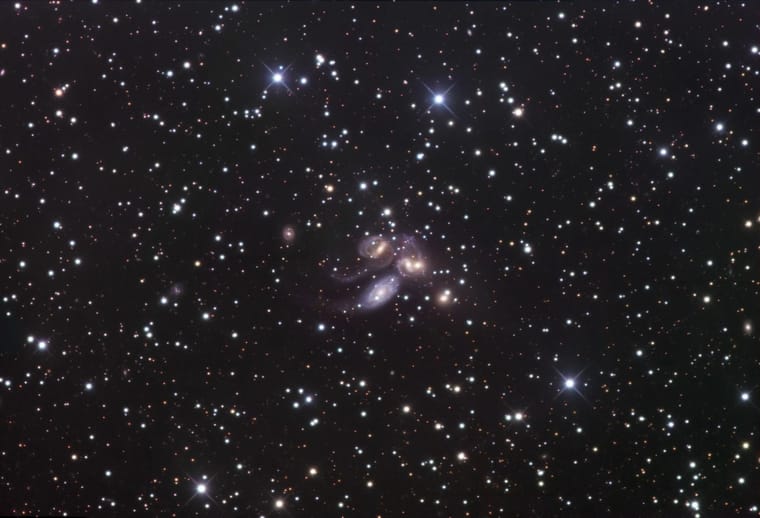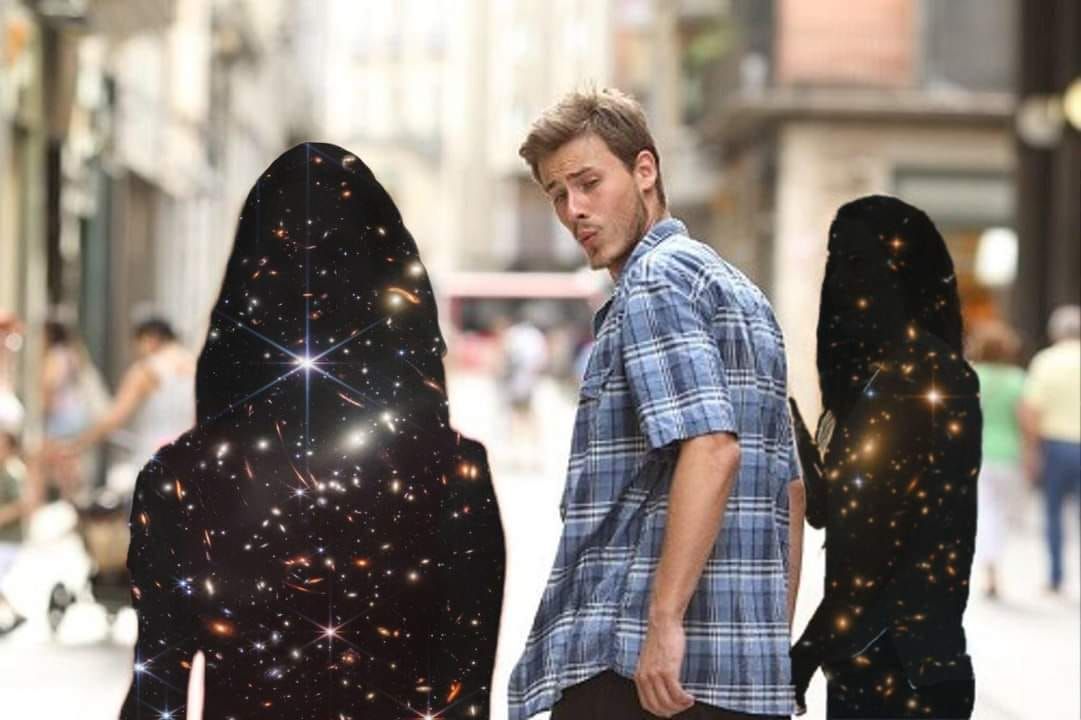James Webb Space Telescope Launch Update
-
@mark those are amazing!
@Doctor-Phibes said in James Webb Space Telescope Launch Update:
@mark those are amazing!
Thanks Phibes! I intend to keep doing it well into old age. I hope to get some new photos this year.
-
@89th Best guess on this one as I don't have the raw .fits files handy and it might take me resuscitating an old Mac Quad G5 Tower to locate them. lol
I will base my estimates on the location and filters used, which we do have listed on the website. Apparently I failed to update the exposure data. This was taken from Trent's backyard observatory and Roland's observatory at Astro-Physics.
So, anywhere from 5-10 minutes for the R, G, and B exposures to 30, or even possibly 60 minutes for the H-Alpha narrow bandwidth filter.
I estimate we have 25 to 50 exposures per filter, per telescope. Which equates to 225 - 450 individual Red, Green and Blue exposures. An additional 30 or more H-Alpha frames from my telescope. Easily 30 hours of H-Alpha as it was our minimum. I probably did more like 50 hours.
Although I also provided RGB frames, my job was to capture the narrowband H-Alpha lines. The H-Alpha filter is calibrated to only pass a wavelength of 656.3 nanometers with a tolerance of 5nm on each side of 656.3. The Ha filter only permits light that is passing through hydrogen. We assigned it to the Red channel.
This chart shows the commonly used narrowband filters:

https://customscientific.com/astronomy.html
So you start by reviewing every single exposure for any issues like tracking or guiding errors, airplanes and satellites passing through, focus drift, atmospheric turbulence , etc. If you find any issues, you reject the exposure.
Each color channel's exposures are then combined in software that produces a median pixel value over the number of exposures for every pixel in the photo.
Once you cull and combine the exposures, each one is placed in the corresponding color channel in photoshop. The Ha exposures are done separately and then combined into the red channel along with the Ref exposures. The Ha provides much finer details in the hydrogen gas clouds.
Then you go through a series of color balance, levels, curves, and possibly add an un-sharp mask to coax more detail. Everything is done in small increments. It could take days or even weeks to process these images. Our M31 took over a month just to process all the data.
-
One of the best Amateur Stephan's Quintet I have seen.
Robert Gendler was active in the hobby at the same time that were active. His portfolio is immense and extremely well done.He used a 20" diameter telescope for this one.

click on the image to see a full size version.
-
One of the best Amateur Stephan's Quintet I have seen.
Robert Gendler was active in the hobby at the same time that were active. His portfolio is immense and extremely well done.He used a 20" diameter telescope for this one.

click on the image to see a full size version.
-
I have no idea regarding the accuracy of the attribution of this quotation, but the sentiment seems about right.
"To consider the Earth as the only populated world in the infinity of space is as absurd as to assert that in an entire field of seeds only one plant will grow."
Metrodorus of Chios, a student of Democritus, 4th century BCE.
-
@George-K @mark I agree. There is something that says, if only one out of a billion galaxies has a solar system, and only one out of billion solar systems has a planet and if only one out of billion of those plants is not too hot/cold, and only one out of a billion not too hot/cold planets can support life, then the number of planets with life is billions.
@89 I think that there is "intelligent" life out there, other than us of course. (But then, some would say that we are not too intelligent)
-
The Fermi paradoxis the conflict between the lack of clear, obvious evidence for extraterrestrial life and various high estimates for their existence. As a 2015 article put it, "If life is so easy, someone from somewhere must have come calling by now."[3]
Italian-American physicist Enrico Fermi's name is associated with the paradox because of a casual conversation in the summer of 1950 with fellow physicists Edward Teller, Herbert York, and Emil Konopinski. While walking to lunch, the men discussed recent UFO reports and the possibility of faster-than-light travel. The conversation moved on to other topics, until during lunch Fermi blurted out, "But where is everybody?" (although the exact quote is uncertain).
There have been many attempts to explain the Fermi paradox,[5][6] primarily suggesting that intelligent extraterrestrial beings are extremely rare, that the lifetime of such civilizations is short, or that they exist but (for various reasons) humans see no evidence. This suggests that at universe time and space scales, two intelligent civilizations would be unlikely ever to meet, even if many developed during the life of the universe.
Chain of reasoning
The following are some of the facts and hypotheses that together serve to highlight the apparent contradiction:- There are billions of stars in the Milky Way similar to the Sun.
- With high probability, some of these stars have Earth-like planets in a circumstellar habitable zone.
- Many of these stars, and hence their planets, are much older than the Sun. If the Earth is typical, some may have developed intelligent life long ago.
- Some of these civilizations may have developed interstellar travel, a step humans are investigating now.
- Even at the slow pace of currently envisioned interstellar travel, the Milky Way galaxy could be completely traversed in a few million years.[12]
- And since many of the stars similar to the Sun are billions of years older, Earth should have already been visited by extraterrestrial civilizations, or at least their probes.
- However, there is no convincing evidence that this has happened.
-
The last point about the low feasibility of finding other intelligent life forms, even if they exist, has always seemed to me to be parsimonious and satisfying. Even if it’s a downer. Space is too big and unnavigable. Even if intelligent life existed on the next nearest solar system, we still wouldn’t know about it.
-
The last point about the low feasibility of finding other intelligent life forms, even if they exist, has always seemed to me to be parsimonious and satisfying. Even if it’s a downer. Space is too big and unnavigable. Even if intelligent life existed on the next nearest solar system, we still wouldn’t know about it.
@Horace said in James Webb Space Telescope Launch Update:
Even if intelligent life existed on the next nearest solar system, we still wouldn’t know about it.
I've evangelized Alastair Reynolds' books in the "Revelation Space" universe. He is a former astrophysicist who gave it up to write sci-fi which is fairly well-grounded in current scientific theory - IOW, no faster-than-light travel. You can get close, but not exceed the speed limit.
He addresses the Fermi paradox by hypothesizing that something (and I won't go deeper than that to avoid spoilers) is preventing civilizations from expanding too much out of their sandbox.
His works are hard, obscure, and very, very dense. @Horace , I think you mentioned you liked Hyperion. You might enjoy this stuff. If so, let me know, and I'll suggest an order of books to read. I didn't follow publication timeline, but narrative timeline. I found it satifying, because the "first" book in the timeline is difficult.
-
@Horace said in James Webb Space Telescope Launch Update:
Even if intelligent life existed on the next nearest solar system, we still wouldn’t know about it.
I've evangelized Alastair Reynolds' books in the "Revelation Space" universe. He is a former astrophysicist who gave it up to write sci-fi which is fairly well-grounded in current scientific theory - IOW, no faster-than-light travel. You can get close, but not exceed the speed limit.
He addresses the Fermi paradox by hypothesizing that something (and I won't go deeper than that to avoid spoilers) is preventing civilizations from expanding too much out of their sandbox.
His works are hard, obscure, and very, very dense. @Horace , I think you mentioned you liked Hyperion. You might enjoy this stuff. If so, let me know, and I'll suggest an order of books to read. I didn't follow publication timeline, but narrative timeline. I found it satifying, because the "first" book in the timeline is difficult.
@George-K said in James Webb Space Telescope Launch Update:
@Horace said in James Webb Space Telescope Launch Update:
Even if intelligent life existed on the next nearest solar system, we still wouldn’t know about it.
I've evangelized Alastair Reynolds' books in the "Revelation Space" universe. He is a former astrophysicist who gave it up to write sci-fi which is fairly well-grounded in current scientific theory - IOW, no faster-than-light travel. You can get close, but not exceed the speed limit.
He addresses the Fermi paradox by hypothesizing that something (and I won't go deeper than that to avoid spoilers) is preventing civilizations from expanding too much out of their sandbox.
His works are hard, obscure, and very, very dense. @Horace , I think you mentioned you liked Hyperion. You might enjoy this stuff. If so, let me know, and I'll suggest an order of books to read. I didn't follow publication timeline, but narrative timeline. I found it satifying, because the "first" book in the timeline is difficult.
Sure, thanks George. What’s your recommended order?
-
 G George K referenced this topic on
G George K referenced this topic on
-
@George-K said in James Webb Space Telescope Launch Update:
@Horace said in James Webb Space Telescope Launch Update:
Even if intelligent life existed on the next nearest solar system, we still wouldn’t know about it.
I've evangelized Alastair Reynolds' books in the "Revelation Space" universe. He is a former astrophysicist who gave it up to write sci-fi which is fairly well-grounded in current scientific theory - IOW, no faster-than-light travel. You can get close, but not exceed the speed limit.
He addresses the Fermi paradox by hypothesizing that something (and I won't go deeper than that to avoid spoilers) is preventing civilizations from expanding too much out of their sandbox.
His works are hard, obscure, and very, very dense. @Horace , I think you mentioned you liked Hyperion. You might enjoy this stuff. If so, let me know, and I'll suggest an order of books to read. I didn't follow publication timeline, but narrative timeline. I found it satifying, because the "first" book in the timeline is difficult.
Sure, thanks George. What’s your recommended order?
-
@George-K interesting questions.
I would say that the dinosaurs were "intelligent life". If there was not a meteor millions of years ago, would humans be here today?
Or instead would be it some form of dinosaur - while they were intelligent, they had been around for hundred of millions of years but still were pretty primitive.
Anyways, fun questions to think about.


